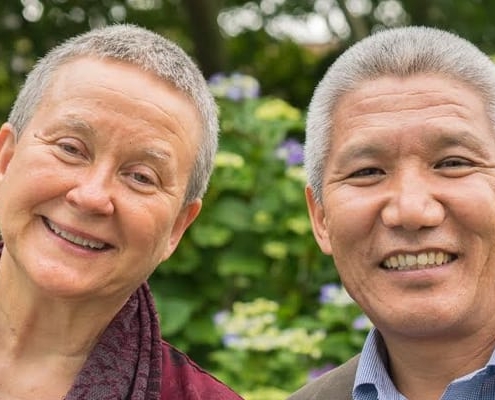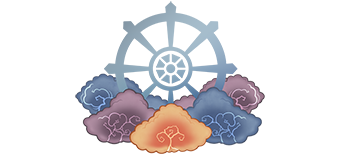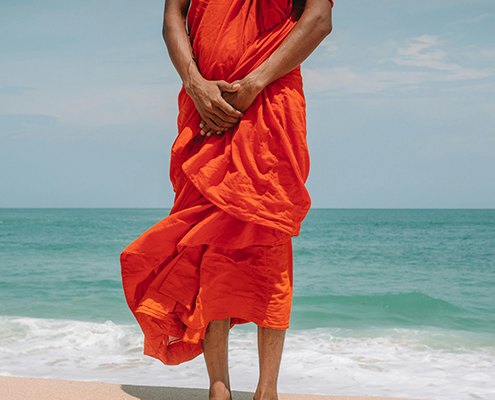
Article: The Healing Potentials of Buddhist Philosophy in a Modern Therapeutic Environment
Applied Buddhist Psychology, Article, Depth Hypnosis, Isa Gucciardi, Mind TrainingIn articulating Buddhism primarily as a path of healing, the teachings at the Sacred Stream offer the living transmission of Buddhism accessible to individuals with diverse cultural backgrounds. The classes at the Sacred Stream combine accessibility and authenticity of Buddhist practice in a way that does not require a rigidity of cultural expression and does not sacrifice the authenticity of a living Dharma tradition. This is a tremendous contribution to all who desire to deepen their understanding of practice in Buddhism but have been uncertain at how they can practice genuinely, without appropriation, and without forcing themselves into unfamiliar cultural practices.
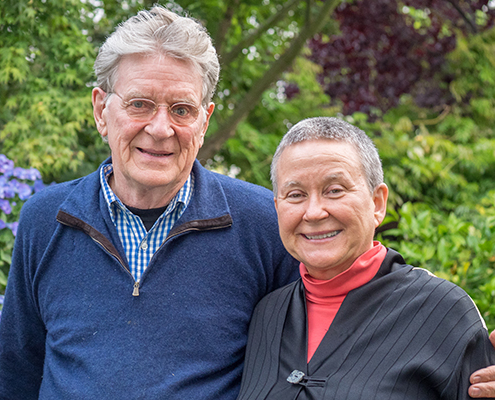
Article: Tara, Bob, & Me
Applied Buddhist Psychology, Article, Buddhism, Isa Gucciardi, Robert ThurmanBy Isa Gucciardi, Ph.D.
Robert Thurman and I spent several years teaching a class called Embracing the Sacred Feminine. The class was an exploration of the power of the feminine within Buddhist philosophy. At the beginning, I was surprised that Bob wanted to teach this class together because it was outside of his usual focus in teaching. But it was right in the heart of mine. I had been teaching two classes, the Initiations of the Sacred Feminine and Tracking Spirit in the Birth Environment: The Creative Portal for many years. I was excited to teach what I knew from this perspective and learn more about the power of the feminine within Buddhist philosophy when I accepted his invitation.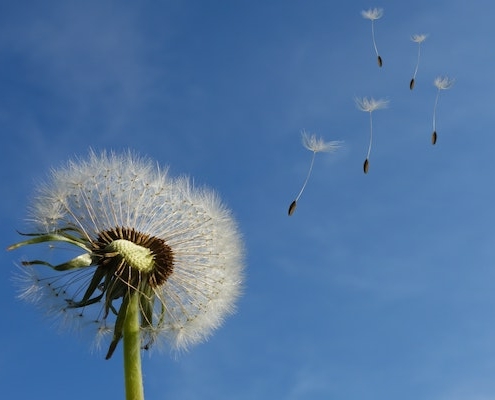
Article: Tonglen – An Integrated Energy Medicine Point of View
Applied Buddhist Psychology, Article, Buddhism, Compassion, Empowered Living, Geshe Pema Dorjee, Inner Wisdom, Integrated Energy Medicine, Isa GucciardiBy Joanna Foote Adler, PsyD, CHT
Much has been written on the practice of Tonglen, the Tibetan Buddhist meditation practice of giving and taking. Tonglen is a powerful and important practice in many of the schools of Buddhism. I would like to offer some thoughts to add to this literature from the perspective of Integrated Energy Medicine as it is taught at the Foundation of the Sacred Stream, which will hopefully help to focus this practice for western practitioners in a skillful way.
Article: The Unseen Teacher
Applied Buddhist Psychology, Applied Shamanism, Article, Buddhism, Depth Hypnosis, Empowered Living, Inner Wisdom, Isa GucciardiBy Isa Gucciardi, Ph.D.
Teaching and learning have never been separate for me. As a learner, I have always been keenly aware of the fact that I am being taught from within as I try to master a skill. I can feel the internal teaching change me in a different way than the external learning changes me. I remember being taught how to sight read as I was learning to play the piano. My piano teacher taught me the concept of matching the notes on the page with the notes on the keyboard, but when I read the notes on the page, I could feel an unseen teacher aligning me with the music. I was being taught how to play the piano, but I was also learning a new alignment to the world.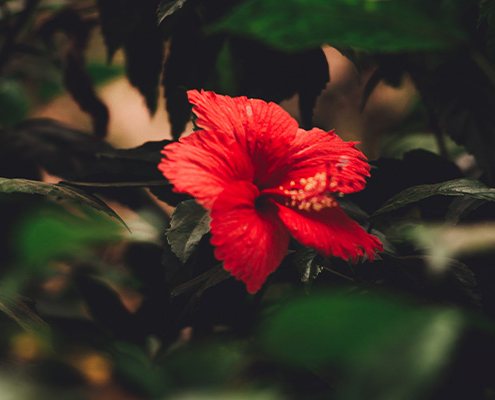
Article: Book Review: A Fearless Heart: How the Courage to Be Compassionate Can Transform Our Lives
Applied Buddhist Psychology, Article, Buddhism, Compassion, Empowered Living, Thupten JinpaBy Barry Lipscomb
Reading A Fearless Heart was a very powerful, transformative, and healing experience for me personally. This was heightened by reading the book the same week I began the Sacred Stream's Applied Buddhist Psychology 1: Entering the Stream class, and started practicing Shamata meditation. It seems my heart is breaking open and expanding in new directions, as if compassion and loving-kindness is the last frontier.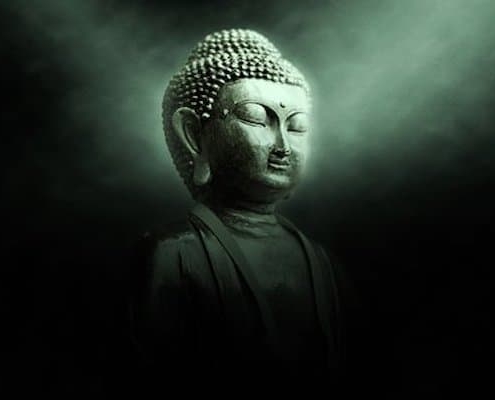
Article: Book Review: Tsongkhapa, a Buddha in the Land of Snows
Applied Buddhist Psychology, Article, Buddhism, Isa Gucciardi, Thupten JinpaBy Isa Gucciardi, Ph.D.
Tsongkhapa, a Buddha in the Land of Snows is Buddhist scholar Thupten Jinpa’s contribution to Shambhala Publications’ remarkable series, The Lives of the Masters, which seeks to memorialize the contributions of some of the most important thinkers in Buddhist philosophy. Tsongkhapa, who lived from 1357-1419, is considered one of the greatest Buddhist philosophers and teachers that ever lived.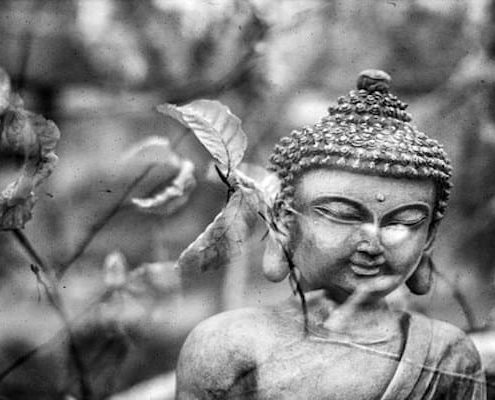
Article: The Journey: Buddhism and Shamanism at the Crossroads
Applied Buddhist Psychology, Applied Shamanism, Article, Buddhism, Depth Hypnosis, Inner Wisdom, Isa Gucciardi, Shamanic Journey, The Eightfold PathBy Isa Gucciardi, Ph.D.
We live in a time of paradox. On the one hand, wars and conflicts of all sorts rage all around us. The Earth is buckling under the effect of them. We also live in a time where there are opportunities for innovative solutions to our situation. We could focus on different types of innovations – technology, new ways of doing business, and more. But here, I would like to focus on the new spiritual and healing possibilities that are emerging to address this crisis. These approaches to addressing the difficulties of the current time can help us explore consciousness in ways that might not be accessible in less tumultuous times.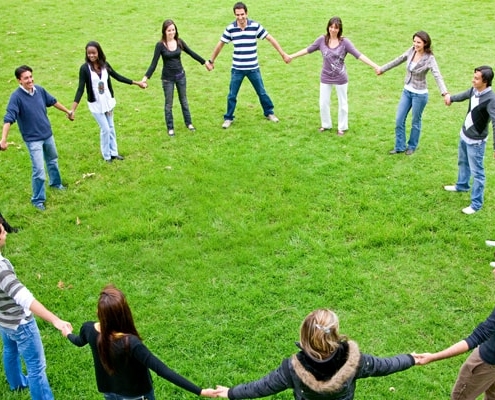
Article: Relationship as a Vehicle for Consciousness
Applied Buddhist Psychology, Article, Depth Hypnosis, Empowered Living, Energetic Patterns, Karma, RelationshipsBy Isa Gucciardi, Ph.D.
Relationship forms the core of our experience as humans. We define ourselves and are defined by the nature of our relating. The Buddhist concept of interdependence affirms that nothing exists independently. Everything exists interdependently. In relationship, we do not and cannot exist independently of one another. It is through relationship that we come to know ourselves. It is through relating that we hold up a mirror to others for them to come to know themselves. Others do the same for us, providing us with information about ourselves that we could not see without the lens of relating. In this way, relationship provides us with a path of revelation. As we learn more about ourselves, our experience takes on richer meaning.
Article: Driving with Bob: One Short Day on Tour with Robert Thurman
Applied Buddhist Psychology, Article, Depth Hypnosis, Robert Thurman, Stanislav GrofBy Isa Gucciardi, Ph.D.
Venus was rising in the eastern sky as we headed south for the next event where Robert Thurman was presenting a paper. This was to be the third major lecture he would deliver within thirty-six hours, and Bob was full of energy, settling into his computer to finalize the notes for this lecture. As I drove, dawn illuminated the hills and valleys. The clouds on the horizon echoed their undulations. There were no other cars on the road. I had never been to the old mansion where the conference was taking place, and I was a little worried about my navigational skills.